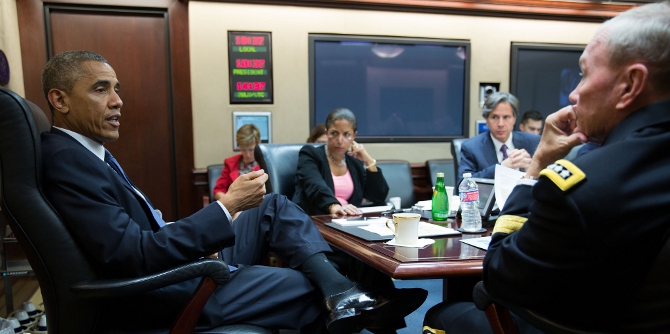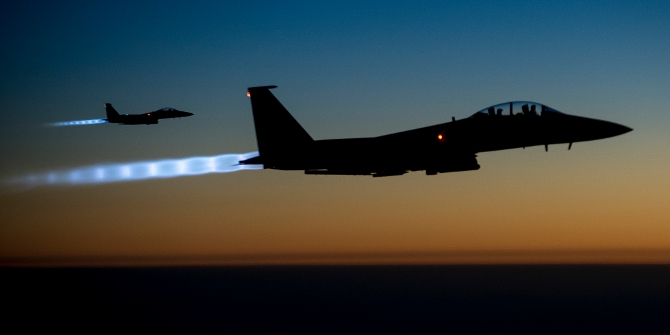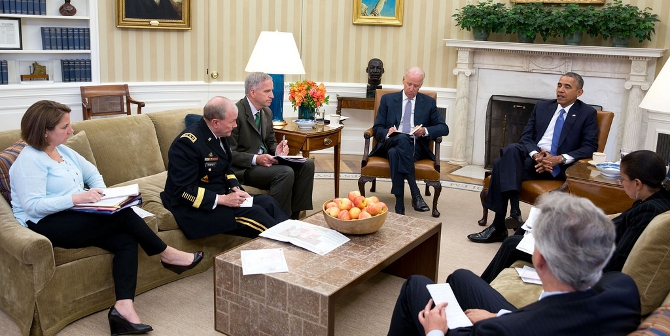 Late last week, President Obama announced that the US would begin targeted airstrikes against Islamic State artillery positions in northern Iraq. Kristian Coates Ulrichsen writes that facing a war-weary public, the administration should use this as an opportunity to develop a new approach to Iraq with local and regional partners that builds upon and does not squander the temporary convergence of policy in overcoming the threat from the Islamic State.
Late last week, President Obama announced that the US would begin targeted airstrikes against Islamic State artillery positions in northern Iraq. Kristian Coates Ulrichsen writes that facing a war-weary public, the administration should use this as an opportunity to develop a new approach to Iraq with local and regional partners that builds upon and does not squander the temporary convergence of policy in overcoming the threat from the Islamic State.
The limited air strikes launched from the USS George H.W. Bush on Islamic State artillery positions in northern Iraq threaten to draw a reluctant Obama administration back into the maelstrom of Iraq. While the action has been portrayed partially in terms of preventing a humanitarian catastrophe and a massacre of Iraq’s ethnic minorities, the speed with which the administration eventually mobilized reflected the spiralling threat to US interests in Iraq and, in particular, in Iraqi Kurdistan. After the protracted agonizing over whether to commit military resources to any form of humanitarian intervention in Syria last August, the administration has acted fast to protect core US interests in Iraq. Yet, there is little political or public appetite in the United States for new military involvement in the Middle East. To allay fears of getting drawn inexorably back into Iraq, the administration must engage with local and regional partners to ensure that the temporary alignment of interest in rolling back the Islamic State translates into a coordinated approach to the country and the wider region.
When the Islamic State made its initial breakthrough to capture Iraq’s second-largest city, Mosul, on 10 June, US reluctance to commit military resources to Iraq stemmed from deep unease at the attempts by Nouri al-Maliki to negotiate a third-term as prime minister. Officials in DC perceived that Maliki’s increasingly authoritarian style of governing was at least partially responsible for alienating Iraq’s Sunni communities and foreclosing the possibility of an inclusive government in Baghdad. In recent weeks, the incongruity between the political wrangling over the shape of a new governing coalition even as much of Iraq fell outside government control became inescapably stark. Events on the ground have, however, forced the Obama administration’s hand and de-linked the deployment of US force to initial suggestions that Maliki must step down as the price of such support.
For more than a month, the US military has quietly been scaling up its activities in Iraq. This has taken the form of dozens of daily reconnaissance flights to develop a detailed intelligence picture of events on the ground in northern Iraq and the creation of direct links with key Iraqi security headquarters. In addition, in June, the US moved its Joint Operations Center and some embassy staff to Erbil, the capital city of Iraqi Kurdistan, where some 40 military advisers were also stationed. Their transfer represented the confidence of US policymakers in their partners in the Kurdish Regional Government, who have long sought to portray Kurdistan as a haven of safety and stability in Iraq. Kurdish peshmerga forces moreover were assumed to be capable of resisting any threat from the Islamic State, particularly after they took advantage of the security vacuum to take control of the sought-after city of Kirkuk in June.

Over the past week, a series of Islamic State advances eastward from Mosul shattered assumptions that the peshmerga could act as a credible buffer against the group. Rather than stand and fight, it appears that peshmerga units withdrew from the towns of Qaraqosh, Tal Kayf, Bartella, and Karamlesh, areas they had controlled since the fall of Saddam Hussein in 2003. In addition to placing the Islamic State less than 30 miles from Erbil, the fall of these predominantly Christian towns added a potent humanitarian dimension to the equation as international attention already was focusing on the plight of Iraq’s Yazidi minority following their own expulsion from the town of Sinjar after it fell to Islamic State forces the weekend before. This humanitarian impulse notwithstanding, it was the military and strategic imperative of forestalling any assault on Erbil that finally galvanized the US into action, in ways that the fall of Mosul in June and even the early reports of the Yazidis’ plight on Mt. Sinjar had failed to do.
Where does the United States go from here? Just as the June gains by the Islamic State signified the final collapse of the Bush administration’s hopes for a stable post-occupation Iraq, so the return of US forces threatens to unravel the Obama administration’s signal achievement in drawing down and then withdrawing all US combat troops from Iraq in 2011. In following in the footsteps of his three immediate predecessors as president by ordering military operations in Iraq, President Obama will want to avoid both the tortured entanglement of the George W. Bush presidency and the ultimately inconclusive outcomes of the George H.W. Bush and Bill Clinton approaches to Iraq. Just as US policy in the 1990s sought to contain Saddam Hussein, the challenge for the current generation of American policymakers is to devise a way of containing and eroding the threat posed by the Islamic State.
One advantage the administration has is that there is today a wider Iraqi and regional consensus in favour of greater US engagement than in previous instances of military intervention. Souring relations between the Kurdish Regional Government and Baghdad over the former’s territorial gains and ongoing disputes over oil policy may lessen temporarily as each confronts a common threat for once. Key US allies in the Gulf have belatedly acknowledged the destabilizing power of extremist Sunni groups after years of tacitly supporting broadly similar bands of rebel fighters in Syria. There is even an opportunity for US and Iranian officials to use the latest Iraq crisis to outline the parameters of a coordinated approach that emphasizes the similarities rather than the differences in approach toward regional politics.
It will not be easy for any or all this to happen. Military airstrikes must be buttressed by patient diplomacy with US partners and, if possible, Iran, and articulated within a comprehensive political approach to resolving Iraq’s current problems. If anything positive can emerge from developments over recent weeks and months, it is the urgent need for a new approach to Iraq that builds upon and does not squander the temporary convergence of policy in overcoming the threat from the Islamic State.
Please read our comments policy before commenting.
Note: This article gives the views of the author, and not the position of USApp– American Politics and Policy, nor of the London School of Economics.
Shortened URL for this post: http://bit.ly/1A77L8m
______________________
About the author
 Kristian Coates Ulrichsen – Rice University
Kristian Coates Ulrichsen – Rice University
Kristian Coates Ulrichsen is a Research Fellow at Rice University’s Baker Institute for Public Policy, an Associate Fellow at Chatham House, and a Visiting Fellow at the LSE Middle East Centre. He is also an Affiliate Faculty at the Henry M. Jackson School of International Studies at the University of Washington-Seattle. His research focuses on the political economy and regional security dynamics of the Gulf and Arabian Peninsula.





